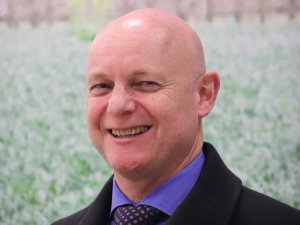NZ Catchment Groups Thrive with ‘Source to Sea’ Approach
The most successful catchment groups in NZ are those that have 'a source to sea' approach.
 MPI director general Ray Smith says it was time to move on and bring a close to the legal challenges that have been running since 2014.
MPI director general Ray Smith says it was time to move on and bring a close to the legal challenges that have been running since 2014.
A long running legal dispute between the Crown (MPI) and a group of kiwifruit growers over the incursion of kiwifruit vine disease Psa has been settled out of court.
The litigation arose from the 2010 incursion of the kiwifruit vine disease Psa.
Strathboss Kiwifruit Limited, representing a group of kiwifruit growers, post-harvest operator Seeka Limited and others, have agreed to accept a Crown offer of $40 million, which includes a significant contribution from the Crown’s insurers of $15m.
The plaintiffs had originally brought a claim for $450 million plus interest against the then Ministry of Agriculture and Forestry (MAF) for allowing the Psa into NZ. The claimants took MAF to court to gain compensation for the losses they suffered as a result of disease.
The case went to the High Court and the Court of Appeal and was due to go to the Supreme Court last week, but the parties decided to call it a day and settle out of court.
Ministry for Primary Industries (MPI) director general Ray Smith said all parties agreed that it was time to move on and bring a close to the legal challenges that have been running since 2014.
“This payment to settle is a sensible one on a per-head basis given the number of claimants in the class action, and their legal and litigation funder costs. But the settlement acknowledges the grievance felt by the kiwifruit sector plaintiffs.”
Smith says the settlement confirms the earlier judgment of the Court of Appeal, which in April 2020 found it would not be fair, just or reasonable to make the Crown legally responsible for losses of this kind. The court also ruled that no legal duty of care was owed by the relevant MAF staff to the plaintiffs and noted they were protected by a statutory immunity, as was the Crown.
Smith says the settlement gives immediate financial certainty for the Crown and avoids a complex Supreme Court hearing and a long wait for a decision.
“Much work has been done to enhance and improve the way we manage pre-border risk, import processes at the border and incursions that inevitably occur. New Zealanders can have confidence in our current biosecurity system.”
Kiwifruit Claim Chairman, John Cameron said the $40m settlement concludes what has been a long, hard and stressful fight for the kiwifruit growers.
He says the settlement provides some compensation to growers whose livelihoods were devastated by the Psa incursion.
“Importantly, we have achieved what we set out to do which was to hold the Government accountable for its negligent actions tha caused the Psa outbreak.
“This was a very tough decision. Our case was meritorious and deserving, but we understand litigation is extremely risky and uncertain even for cases with such strong facts such as this one.”
Cameron says the Kiwifruit Claim Committee explored every option to ensure the growers got the best outcome and after consulting with its legal team and obtaining further independent legal advice, they were advised to accept the settlement.
He says what happened to the kiwifruit industry in 2010 was entirely preventable.
“MPI knew Psa existed, they knew the damage it could cause if it was let into the country and they breached their own protocols that were in place to keep it out. It is critical our primary industries can rely on our government to perform their biosecurity role with reasonable care and skill; we don’t want to ever see this happen again.”
Controls on the movement of fruit and vegetables in the Auckland suburb of Mt Roskill have been lifted.
Fonterra farmer shareholders and unit holders are in line for another payment in April.
Farmers are being encouraged to take a closer look at the refrigerants running inside their on-farm systems, as international and domestic pressure continues to build on high global warming potential (GWP) 400-series refrigerants.
As expected, Fonterra has lifted its 2025-26 forecast farmgate milk price mid-point to $9.50/kgMS.
Bovonic says a return on investment study has found its automated mastitis detection technology, QuadSense, is delivering financial, labour, and animal-health benefits on New Zealand dairy farms worth an estimated $29,547 per season.
Pāmu has welcomed ten new apprentices into its 2026 intake, marking the second year of a scheme designed to equip the next generation of farmers with the skills, knowledge, and experience needed for a thriving career in agriculture.

OPINION: Here w go: the election date is set for November 7 and the politicians are out of the gate…
OPINION: ECan data was released a few days ago showing Canterbury farmers have made “giant strides on environmental performance”.